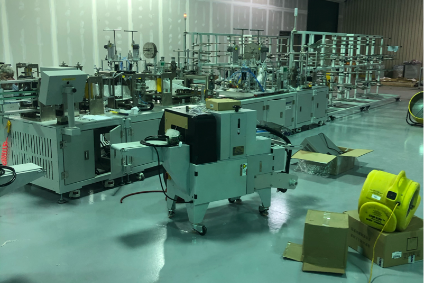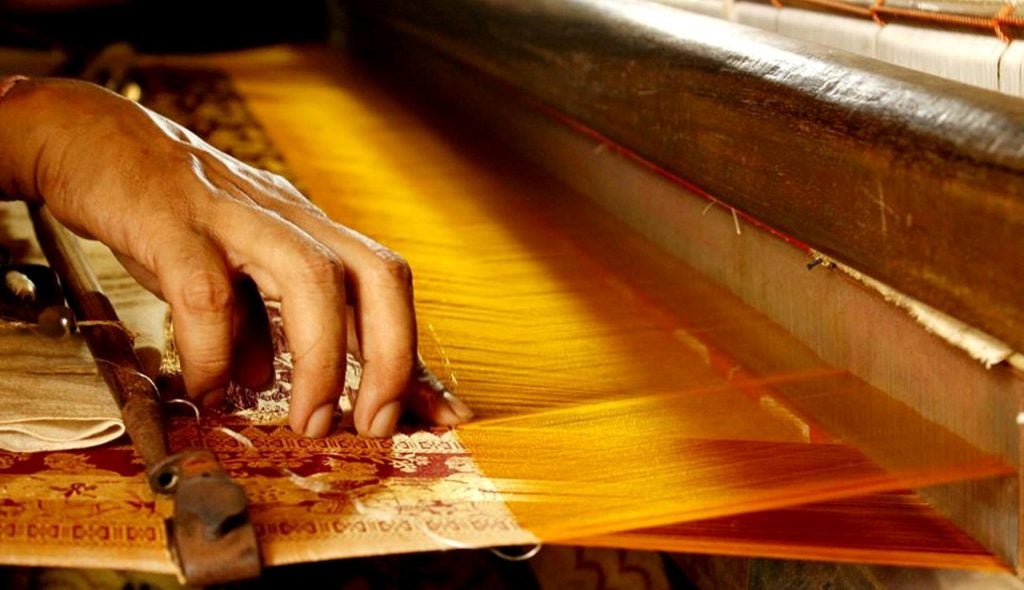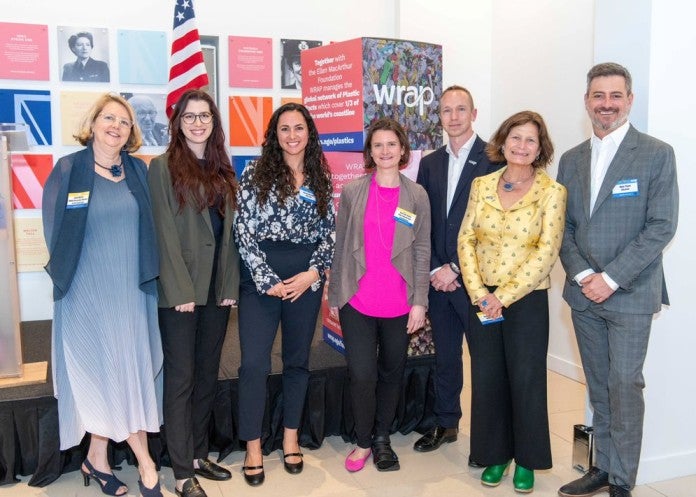
A shortage of personal protective equipment (PPE), including face masks, triggered by the global coronavirus (Covid-19) pandemic has prompted US domestic textile companies to mobilise their production facilities and supply chains to fill the void. Here’s the story of Vidalia Mills – by industry consultant Robert Antoshak, who helped oversee the project.
For most of July, I worked closely with one of my clients, Vidalia Mills, to install five automated mask-making machines. During that time, I rented a small house in Natchez, Mississippi, across the river from the mill’s namesake Vidalia, Louisiana, and worked in the plant.
Now, I’m not an engineer; I’m a business consultant. Which means I talk a lot and don’t lift heavy objects. With this project, however, my role was to assist the company’s management in obtaining the machines, and working with raw material suppliers. I also worked with subcontractors on layout, coordinating on logistics with the plant manager, and company human resources to secure a team of workers to staff the equipment.
And beyond all else, my role was to ensure that the project would not fail, a “fixer” of sorts to handle logistical problems, coordinate planning, and follow through on execution. My job was to make sure everything that was supposed to be done was done.
Fortunately, during my time at Vidalia, I teamed up with Patrick Stewart, CEO of Keep It Here, a Los-Angeles based clothing manufacturer. His company makes sewn masks these days and T-shirts and jeans (during normal times). Thank goodness he was on board with us and had apparel manufacturing experience, pragmatism, and smarts, to bring the project together. Otherwise, I would have been totally lost in the process. He has been instrumental in working with Vidalia’s raw material suppliers to make sure enough nonwoven fabric was in place to get mask production underway. No small undertaking, for sure.
See Also:
A mask backstory
How well do you really know your competitors?
Access the most comprehensive Company Profiles on the market, powered by GlobalData. Save hours of research. Gain competitive edge.

Thank you!
Your download email will arrive shortly
Not ready to buy yet? Download a free sample
We are confident about the unique quality of our Company Profiles. However, we want you to make the most beneficial decision for your business, so we offer a free sample that you can download by submitting the below form
By GlobalDataTo fully understand Vidalia’s foray into surgical masks, let’s turn the clock back a few months. The Covid pandemic was in full bloom. People were sickened by the disease every day around the US. Public health officials cried out for more medical supplies – masks, gowns, gloves etc. You name it, the medical corps needed it.
But there was a hitch. When local, state, and federal authorities looked for sources of supply, they came up mostly empty. Many of the products deemed essential simply didn’t exist in large enough quantities within the US. Indeed, the vast majority of such products were sourced from overseas. And guess what? The countries where those products were made stayed in those countries when the pandemic first took hold. Exports took a back seat to safeguard their people.
More so, existing quantities of crucial supplies in the domestic medical system were geared for usage levels before the outbreak. The country was caught short. No degree of rhetoric from Washington or even denial from ordinary citizens could escape that fact. The nation lacked adequate face masks, testing kits, or even hand sanitiser.
So, what to do? The globalised system of trade – a system heartily supported and endorsed by America since the founding of the WTO – collapsed at America’s most critical hour of need. Global supply chains were ravaged by Covid-19, as national interests took priority, and business was shut down.
And the pandemic continued to spread. Add in political inaction in Washington, and we had a recipe for a national calamity. That’s when domestic firms stepped up to meet the challenge.
Indeed, domestic textile companies banded together to produce many of the much-needed products in a crash programme. They worked hard to fill the void left by globalisation. Following is the story of one such textile company, Vidalia Mills.
The main event: A start-up within a start-up
But this is all backstory leading up to the main event: installing the mill’s automatic mask-making machines. It’s a start-up for those not familiar with Vidalia Mills, a maker of yarn, denim and other textiles. The mill is based in Vidalia, Louisiana. It has a partnership with Omniverse Group, the parent company of apparel maker Keep It Here, to make masks, both sewn by hand and automated machines running nonwoven fabrics.
The mask enterprise is a start-up within a start-up: a new business, for sure, and a way for the company to give back to the nation. And the automated mask machinery is scalable: at full capacity, these machines can make up to 175,000 units a day. One machine makes flat pleated masks, while four other machines make highly coveted N95-grade folded and cup masks. These masks are a far cry from Vidalia’s Draper X3 selvedge denim looms, that’s for sure!
It’s funny when I consider the range of products now offered by Vidalia all from under one roof. At 1.2 million square feet, the company has room to experiment and expand. In reality, the mill operates as a series of companies folded into one space: it has a cotton warehouse business, spins yarn, knits and weaves fabric, and soon will cut and sew finished goods in partnership with Keep It Here.
On top of that, Vidalia is building a product development centre for its customers and a state-of-the-art laundry. And there are even five acres of cotton growing in the mill’s front yard.
But back to masks: the machinery runs American-made nonwoven fabric, but the machines themselves were made in China, assembled with parts made in Germany, purchased from an American maker of sewing machines. So I guess there is some semblance of globalisation left after all? Go figure.
Installation: A case of trial and error
As with all installations, unforeseen problems can crop up, but equally, so do solutions to solve those problems. Because other than crews from the mask machine company on site to lend a hand, no-one else had ever seen one of these machines, let alone installed one.
Nevertheless, Vidalia had many textile engineers available. The team also had a great deal of experience installing all kinds of heavy equipment – from looms to finishing ranges – and stepped up to the task of installing the mask machines, despite the heat and some hiccups along the way.
From the first day, we had a series of challenges. The mill’s mezzanine air conditioning unit failed, so they had to install a new “chiller.” But such a failure occurred when temperatures were typically topping 100 degrees every day and incredibly humid. Despite the heat, everyone persevered.
Even worse, the mask machines were placed on the mill’s mezzanine floor, upstairs, where the mill’s hot air accumulated. I’m afraid to contemplate what the temperature was up there as the crews moved all of the equipment. To make matters worse, everyone had to wear masks to comply with the mill’s strict Covid-prevention requirements. Nevertheless, after the new air conditioning equipment was installed, everyone felt so much better. Problem solved.
Then we had challenges moving the equipment around on the mezzanine floor. Although originally poured atop a superbly engineered steel structure, the concrete flooring could crack if too much weight was placed in specific areas. Interestingly, it wasn’t a case of overall weight. The structure was designed to carry many times the tonnage of the mask machines, but rather how the burden was placed.
So the use of a large forklift was ruled out to move the machines around the floor. The machines were initially hoisted from the main deck via a boom to the mezzanine. That worked fine. But running a forklift to place the machines in their permanent locations after they were uncrated remained a problem. What to do? After some discussion, small semi-automatic lifts were used to uncrate and move the equipment to their assigned locations. Problem solved.
In production: New hires, new opportunities
Ultimately, the machines were installed on unique flooring. This tri-coated material allows the equipment to be rolled easily for fine adjustments and aesthetic considerations. Overhead lights reflect off the floors like it’s a showroom. The machines look cool in this space. The area will be enclosed once production hits commercial levels, and the logistics of loading raw materials, producing, and boxing masks is perfected.
The mill has initially hired about 25 new workers to manage and run the production line for multiple shifts. A trained technician manages each machine, and assistants ensure that all aspects of the mask assembly runs smoothly. Training has gone well. The team of new hires has worked diligently to master the equipment.
The machines produce masks in a highly choreographed way. Multiple layers of nonwovens are loaded into each device from a roller assembly. In turn, inner and outer layers, as well as filtration fabric, are fed into each machine, along with ear loops or headbands, and finally folding, sanitising, and packing the masks into boxes for shipments. The fastest of the devices can produce as much as 100 units a minute.
I’d like to offer praise for Vidalia’s plant manager and VP of operations, Derrick Means. Without Derrick, the mill would not have had the experience necessary to store and ship the masks to customers without the process deteriorating into a mud fight of confusion. A former head of distribution for Fruit of the Loom, Derrick is an expert in supply chain management and 3PL (third-party logistics). Thanks to his experience and talent, Derrick calmed what could have otherwise been a confusing storm of logistics. He is also responsible for screening the mill’s new employees to manage the mask equipment.
What I’ve learned
Although the mill had great success in setting up its mask-making operations, it was not conducted recklessly. Louisiana was severely affected by Covid. Although the town of Vidalia and surrounding communities were spared the brunt of the pandemic, people were infected.
As a result, great care was taken at the mill to ensure the safety of its workers. Masks were required to be worn at all times. Social distancing was also mandatory, and the liberal use of disinfecting hand lotion was also mandated. A team was assigned to frequently wipe down public surfaces, such as railings and doorknobs, with disinfectant.
Ironically, although the mill worked diligently to make masks that would save lives in the general population, the mill’s workers were frontline operators themselves. As a consequence, crews were deployed in lesser numbers than would otherwise be the case pre-Covid. But safety was paramount, even if efficiency suffered. A trade-off worth the effort.
During the mask-installation process, the mill continued to manufacture denim, and spin yarn like it always has, although at a lower rate with smaller shifts as a precaution to blunt any possible spread of Covid in the building.
But in the end, careful planning and diligent execution carried the day. The mask programme operates as a business, but it wasn’t set up as a simple money-grab to cash in on the pandemic; thousands of masks will be distributed at no charge. The humanitarian costs far outweighed profits. The goal was to meet the emergency. And along the way, I learned valuable lessons on addressing problems, finding solutions and helping to make a difference.








Related Company Profiles
Draper, Inc.
DERRICK, INC.
Fruit of the Loom Inc